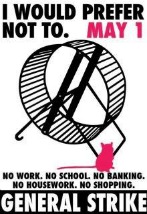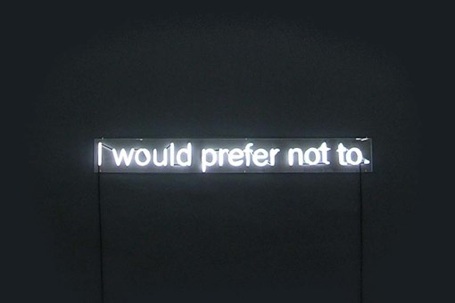‘You think I’m gonna let some clock tell me what to do?’
a chronically unpunctual civil servant says incredulously at the outset of ‘Procrastination: a modern malaise’ (Barbara J. Moore, Antioch Review, 2004). The situationist Guy Debord emblazoned an even more radical sentiment across a Parisian wall in 1953:
(Debord, beloved of punk bands and slacker filmmakers, never did work in any conventional sense: he found a rich patron. Before that his wife ‘supported them both by writing horoscopes for racehorses.’ He was unimpressed when his slogan became a ‘comic’ postcard.)
This post is dedicated the great refuseniks of life and literature—those brave souls who have had the courage to say NO to the modern 9-to-5 (or, today, 24-7) world of work. Such icons are precious. After all, what other role models does history provide for quitters? Nixon, Edward VIII, Sarah Palin, the ex-pope, and Anthony “Wiener” Weiner.
Just say no
Perhaps the most famous refusenik of them all came a century before Debord’s graffito. In Herman Melville’s 1853 short story, Bartleby the Scrivener is hired as a copyist. He seems a decent enough chap. Then one day he presents the narrator, his new boss, with what is to become his catchphrase:
Prefer not to work, not to answer questions, not to move out of the office. Mild, unprepossessing, hostile to change, this most minor of bureaucrats is an unlikely hero, an inverted Oliver Twist with his painfully polite declaration. It becomes clear that he has no friends, no home, no hope. He is a curiously ambivalent refusenik.
Yet this enigmatic figure has become a quiet icon. So many interpretations have been piled upon his pale and silent self that Dan McCall wrote of ‘the Bartleby Industry’, within which the story itself had become all but lost (The Silence of Bartleby, 1989).
Bartleby the everyman
 These glosses vary wildly. He has, inevitably, been read as autistic, schizophrenic or depressed—all that staring at walls—yet Deleuze found him ‘violently comical‘ and the 2001 film somehow managed to introduce ‘sitcom elements’. Ben Affleck’s Bartleby in Dogma (dir. Kevin Smith, 1999), meanwhile, is a murderous rogue angel finally slain by God Herself, aka Alanis Morissette.
These glosses vary wildly. He has, inevitably, been read as autistic, schizophrenic or depressed—all that staring at walls—yet Deleuze found him ‘violently comical‘ and the 2001 film somehow managed to introduce ‘sitcom elements’. Ben Affleck’s Bartleby in Dogma (dir. Kevin Smith, 1999), meanwhile, is a murderous rogue angel finally slain by God Herself, aka Alanis Morissette.
Literature has parasitized the scrivener too. The copyist becomes the noble wordsmith, rejecting the demands of pulp fiction. In Enrique Vila-Matas’s crafty ‘metafiction’ Bartleby & Co. (2000, trans. 2004), he becomes the emblem of all ‘artists of refusal’, including Kafka, Beckett, Musil, Duchamp, Rimbaud, and a host of lesser-known figures. Some, like the reclusive, hunchbacked narrator, can’t or won’t write. Others, most famously Pynchon and Salinger, shun the limelight. Thus even Bartleby’s eventual fate—a quiet hunger strike unto death against the unfeeling world (‘Ah Bartleby! Ah humanity!’)—is interpreted as that ultimate refusal, suicide.
Bartleby is the 99 percent
 If artists have the leisure to kill time (and themselves), it is the world of labour that has most recently embraced Bartleby. He’s one of the army of disposable workers, made redundant from the Dead Letter Office of Washington and surviving only on ginger-nuts. The scrivener thus became an unexpected symbol for the Occupy movement. Melville’s subtitle is, after all, ‘A Story of Wall-Street’. His baffled employer-narrator is a corporate lawyer; he’s basically the first man ever to work in an office cubicle; and eventually he ends up squatting in the office, all the while refusing to touch money. ‘Bartleby,’ the Atlantic pointed out, ‘was the first laid-off worker to occupy Wall Street.’
If artists have the leisure to kill time (and themselves), it is the world of labour that has most recently embraced Bartleby. He’s one of the army of disposable workers, made redundant from the Dead Letter Office of Washington and surviving only on ginger-nuts. The scrivener thus became an unexpected symbol for the Occupy movement. Melville’s subtitle is, after all, ‘A Story of Wall-Street’. His baffled employer-narrator is a corporate lawyer; he’s basically the first man ever to work in an office cubicle; and eventually he ends up squatting in the office, all the while refusing to touch money. ‘Bartleby,’ the Atlantic pointed out, ‘was the first laid-off worker to occupy Wall Street.’
At the movement’s height the IWPN2 catchphrase did the internet rounds. But such is his inscrutability that Bartleby can be interpreted in the opposite fashion. For the New Yorker he is the mascot of social media fatigue: ‘Apathy muddled by strong opinion and obstinacy, the scrivener would fit right in among my generation, posting weary outrage in comments sections.’ In the twenty-first century his rallying cry would be trimmed—to ‘Meh.’
The messianic scrivener

Melville, speculated to be the model for Bartleby, along with Edgar Allan Poe, Henry David Thoreau, Bleak House‘s ‘Nemo’—and Jesus Christ
As if this were not burden enough, a bunch of people have claimed that Bartleby, like Josef K., is Christ. Yes: the quiet bureaucrat as a wandering pilgrim sans Samaritan, Lazarus or a figurative leper (though an older author saw him simply as a corpse). He is Heidegger’s broken tool, a thing of questionable status—like the letters of the dead he used to handle.
The most high-profile exponent of this notion is the Foucauldian philosopher Giorgio Agamben. His most celebrated concept, the ‘state of exception’, is Bartleby-based. He was inspired enough to write a commentary on the short story in 1993. Homo Sacer (1995, trans. 1998) again presents the scrivener as ‘the strongest objection against the principle of sovereignty’.
Bartlebyism is not procrastination in the sense of idleness, Oblomov’s paralysis or Jerome K. Jerome’s gentle chuckles. It requires exertion and, however inchoate, a sense of politics. His mantra is truly subversive, because it ‘resists every possibility of deciding between potentiality and the potentiality not to.’ Agamben’s Bartleby is therefore not pessimistic but redemptive. He is a messiah who would ‘fulfil the Torah by destroying it from top to bottom’—and so enable us to live a life of possibility.
Much ink has been spilled on academics’ and freelancers’ self-exploitation. (And half of us even use a programme called Scrivener!) Tired of your endless scribblings, marking, emailing, reviewing, tweeting? Repeat that great, curiously British mantra:





Excellent blog you’ve got here.. It’s difficult to find excellent writing like yours nowadays.
I really appreciate individuals like you! Take care!!
I relish, result in I discovered just what
I was having a look for. You have ended my 4 day lengthy hunt!
God Bless you man. Have a nice day. Bye